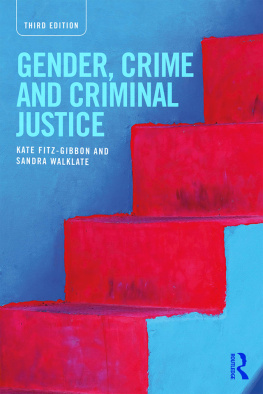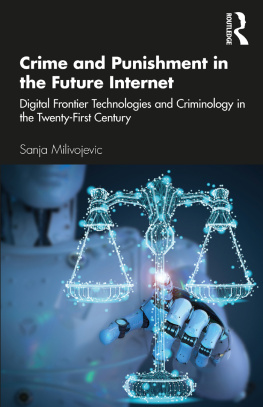
DIGITAL CRIMINOLOGY
The infusion of digital technology into contemporary society has had significant effects for everyday life and for everyday crimes. Digital Criminology: Crime and Justice in Digital Society is the first interdisciplinary scholarly investigation extending beyond traditional topics of cybercrime, policing and the law to consider the implications of digital society for public engagement with crime and justice movements. This book seeks to connect the disparate fields of criminology, sociology, legal studies, politics, media and cultural studies in the study of crime and justice. Drawing together intersecting conceptual frameworks, Digital Criminology examines conceptual, legal, political and cultural framings of crime, formal justice responses and informal citizenled justice movements in our increasingly connected, global and digital society.
Building on case study examples from across Australia, Canada, Europe, China, the UK and the United States, Digital Criminology explores key questions including: What are the implications of an increasingly digital society for crime and justice? What effects will emergent technologies have for how we respond to crime and participate in crime debates? What will be the foundational shifts in criminological research and frameworks for understanding crime and justice in this technologically mediated context? What does it mean to be a just digital citizen? How will digital communications and social networks enable new forms of justice and justice movements? Ultimately, the book advances the case for an emerging digital criminology: extending the practical and conceptual analyses of cyber or e crime beyond a focus foremost on the novelty, pathology and illegality of technology-enabled crimes, to understandings of online crime as inherently social.
Anastasia Powell is Associate Professor in Criminology and Justice Studies at RMIT University. Anastasias research explores the intersections of gender, violence, justice, technology and digital culture. Her previous co-authored and solo-authored books include: Sexual Violence in a Digital Age (2017) and Sex, Power and Consent: Youth Culture and the Unwritten Rules (2010); as well as the co-edited books Rape Justice: Beyond the Criminal Law (2015) and Preventing Sexual Violence (2014).
Gregory Stratton is Lecturer in Criminology and Justice Studies at RMIT University. Gregory also manages the Bridge of Hope Innocence Initiative at RMIT, a collaboration between academics, university students and lawyers who investigate claims of wrongful conviction. His research examines wrongful conviction, state crime, media and crime, and identity in the digital age.
Robin Cameron is Lecturer in Criminology and Justice Studies at RMIT University. Robin is also the manager of the Bachelor of Criminal Justice at RMIT. Robins research focuses on security through an examination of gender, race and violence in urban and online spaces. His books include: Subjects of Security: Domestic Effects of Foreign Policy in the War on Terror (2013) and the co-edited book Human Security and Natural Disasters (2014).
Digital Criminology pushes the boundaries past conventional cybercrime studies by casting its gaze towards the profound transformation of social relations in a digital society. It develops a new programme for criminological inquiry, one that appreciates how the landscapes of crime, justice, and social conflict are being reshaped. Original, ambitious, and challenging this is an important and timely book.
Majid Yar, Professor of Criminology, Lancaster University
Digital Criminology provides a bold, critical framework to challenge the existing paradigms of criminological inquiry. The authors reconceptualize the issues in light of the state of the Internet and technology use in the 21st century and propose a new way to view technological deviance that must be read by scholars and practitioners alike.
Thomas J. Holt, Professor, School of Criminal Justice, Michigan State University
This volume serves as a foundational primer for a truly technosocial criminology, one that moves beyond narrow conventions of cybercrime and more fully engages the emergent harms, inequalities, justice, and activism that make up global digital societies. Digital Criminology is an interdisciplinary feat a must-read for anyone who seeks to do work on media and crime in the contemporary moment.
Michelle Brown, Associate Professor, Department of Sociology, The University of Tennessee
First published 2018
by Routledge
711 Third Avenue, New York, NY 10017
and by Routledge
2 Park Square, Milton Park, Abingdon, Oxon, OX14 4RN
Routledge is an imprint of the Taylor & Francis Group, an informa business
2018 Taylor & Francis
The right of Anastasia Powell, Gregory Stratton, and Robin Cameron to be identified as authors of this work has been asserted by them in accordance with sections 77 and 78 of the Copyright, Designs and Patents Act 1988.
All rights reserved. No part of this book may be reprinted or reproduced or utilised in any form or by any electronic, mechanical, or other means, now known or hereafter invented, including photocopying and recording, or in any information storage or retrieval system, without permission in writing from the publishers.
Trademark notice: Product or corporate names may be trademarks or registered trademarks, and are used only for identification and explanation without intent to infringe.
Library of Congress Cataloging-in-Publication Data
Names: Powell, Anastasia, author. | Stratton, Gregory, author. | Cameron, Robin, 1982- author.
Title: Digital criminology: crime and justice in digital society/Anastasia Powell, Gregory Stratton, Robin Cameron.
Description: New York, NY: Routledge, 2018. | Includes index.
Identifiers: LCCN 2018001651 (print) | LCCN 2018002672 (ebook) | ISBN 9781315205786 (master) | ISBN 9781138636736 (hbk) | ISBN 9781138636743 (pbk)
Subjects: LCSH: Criminology. | Social justice. | Social movements. | InternetSocial aspects.
Classification: LCC HV6025 (ebook) | LCC HV6025.P657 2018 (print) | DDC 364dc23 LC record available at https://lccn.loc.gov/2018001651
ISBN: 978-1-138-63673-6 (hbk)
ISBN: 978-1-138-63674-3 (pbk)
ISBN: 978-1-315-20578-6 (ebk)
Typeset in Bembo
by Sunrise Setting Ltd, Brixham, UK
CONTENTS
The infusion of digital technology into contemporary society has had significant effects for everyday life and for everyday crimes. Digital Criminology: Crime and Justice in Digital Society is the first interdisciplinary scholarly investigation extending beyond traditional topics of cybercrime, policing and the law to consider the implications of digital society for public engagement with crime and justice movements. Drawing together intersecting conceptual frameworks, Digital Criminology examines conceptual, legal, political and cultural framings of crime, formal justice responses and informal citizen-led justice movements in our increasingly connected, global and digital society. Much criminological engagement with computer and cybercrime has, to date, been largely insular; and lacking in a critical and interdisciplinary engagement with fields such as sociology, computer science, politics, journalism, media and cultural studies. In Digital Criminology







